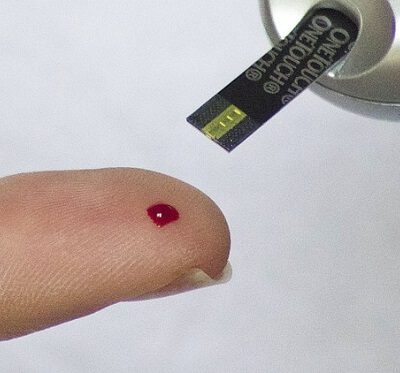

Diabetes is a condition that affects many people in the UK. It is estimated that almost 4 million people are affected. People over 45 are also far more likely to develop diabetes. As a result, diabetes care is crucial in later life, whether you have been diagnosed or are hoping to avoid it. In this article, we will look at the most common types of diabetes, the causes, and how to manage the condition.
Diabetes is a lifelong condition that affects the body’s ability to regulate blood sugar. People with the condition end up with high blood sugar, which can then affect their wellbeing. High blood sugar can damage the kidneys, as well as affecting vision and the heart.
In a healthy person, blood sugar levels are regulated by insulin. This is a special hormone produced by the pancreas. Insulin reacts to the presence of sugar in the body, helping it to access cells. This, in turn, helps fuel our bodies.
For someone with diabetes, this system does not work correctly. Some types of diabetes mean that insulin does not work effectively, or not enough is produced. Others mean the body does not produce any insulin at all.
The two most common forms of diabetes are known as Type 1 and Type 2. Both cause blood sugar to run high.
Type 1 diabetes is caused when the immune system attacks and destroys the cells responsible for producing insulin.
Type 2 diabetes is where the body fails to produce enough insulin to regulate blood sugar. Alternatively, it may be that the cells in the body do not react to the insulin it produces.
Of the two, type 2 diabetes is by far the most common. According to the World Health Organisation, 95% of people with diabetes have type 2.
There are other, rarer types of diabetes, which affect around 2% of people. More information on these types can be found on the Diabetes UK website.
Certain symptoms can be a sign of diabetes. Whilst you are not guaranteed to be diabetic if you have any of them, it is worth getting yourself checked. Symptoms include:
Diabetes is more common in those over 45, but it can affect children too. If diabetes is a concern, arrange a blood test with your GP.
If you have diabetes, you are likely to develop further health problems over time. Diabetes can cause sight loss, kidney failure, and a variety of other complications.
Unfortunately, there are no lifestyle changes that can be made to reduce the likelihood of developing type 1 diabetes. You are, however, less likely to develop it if your family has no history of diabetes.
Type 2 diabetes can be avoided by making the right health choices. Regular exercise, healthy eating, and maintaining a reasonable body weight are all forms of diabetes care that reduce the risk. Like type 1, your risks are also reduced if there is no history of diabetes in your family.
Unfortunately, diabetes can be a lethal condition if not adequately managed. Every week, thousands of people suffer from strokes, heart failure, kidney failure, or strokes as a result of diabetes. Furthermore, high blood sugar can lead to high cholesterol and blood pressure, which can both cause additional health problems.
One of the most dangerous health problems caused by diabetes is diabetic ketoacidosis (https://www.diabetes.org.uk/guide-to-diabetes/complications/diabetic_ketoacidosis), which can lead to comas and even death.
Diabetes is currently an incurable condition. However, its effects can be managed. The same steps taken to reduce the risks of developing diabetes can help to lessen its impact. Staying healthy and eating well can help to keep blood sugar at manageable levels.
For people with type 1 diabetes, diabetes care is not as simple as staying healthy. They require regular insulin injections and will need them for the rest of their life. As they get older, it may become more difficult for them to remember their injections. When this happens, it may be beneficial for them to receive additional care at home.
Type 2 diabetes does not require insulin injections, but it is a progressive condition. As they get older, they may begin to require diabetes care such as tablets. Again, it is possible that in later life their memory may begin to suffer and support with medication may become necessary.
Sometimes this support can be provided by family members, but in some cases individuals with diabetes may benefit from a carer.
Sometimes effective diabetes care requires a helping hand. Here at Abing Homecare, we believe in providing effective, professional support in the comfort of your own home. Our carers can provide aid with all manner of health conditions, offering support with medication, as well as day-to-day chores.
We are dedicated to providing the care that you or your loved ones require, and our care plans are tailored to you. Furthermore, the number of visits you receive is entirely down to you. You could have a carer come in three times a day, once a week, or even once a month.
We offer two main care packages to provide support at home: domiciliary and live-in.
Domiciliary carers attend the premises at pre-arranged times of day to offer support, such as diabetes care.
Live-in carers move into your property to provide 24-hour care. Choosing a live-in carer could be effective if you have concerns about high blood sugar.
All Abing customers also receive a personal alarm as part of their care service.
For more information, check out our FAQs or visit the Help Hub. You can also get in touch with our friendly team on 0800 008 7000 if you have any questions.